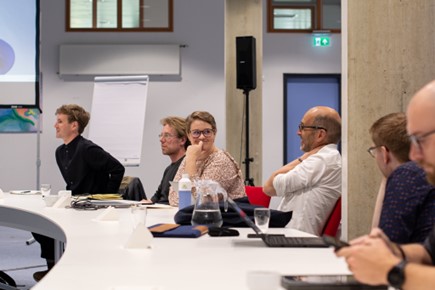Reconfiguring Energy for Post-COVID-19 Development (ReCODE)

Finance workshop which took place in Utrecht, in 2022
Project partners:
CST project members
- Prof. Mark Swilling (PI)
- Dr Megan Davies (co-PI)
- Dr Wendy McCallum (researcher)
- Nichola Richards (research assistant)
External project partners
- Utrecht University
- Indian Institute for Human Settlements
- University of Freiberg
Collaborators
- Development Bank of Southern Africa
- International Development Finance Club
Project period:
2021 – 2023
Project Description:
As a sub-project in ReSET, the ReCODE project aimed to explore the role of development finance institutions (DFIs) in energy transitions, with a focus on the emergence of ‘just energy transitions’ across diverse global contexts. This took place at a critical historical moment, when the developmental role and mandate of DFIs came more strongly to the fore during a global crisis triggered by the COVID-19 pandemic. The ReCODE project investigated whether and how investments in energy transitions by DFIs might be leveraged for the socio-economic recovery from the COVID-19 crisis. Analytically, the project investigated the work that goes into ‘recoding’ the rules in financial decision-making in terms of potential alignments between investments in renewable energy (SDG 7) and other desired outcomes including improved health (SDG3), economically vital communities (SDG 8,11) and more social equity (SDG 5,10).
Throughout history, DFIs have played a critical role in ‘countercyclical investments’ to support recovery from socio-economic crisis. In more recent years, DFIs leveraged their investments in the emerging, and previously high-risk, renewable energy sector, and ultimately led to the global energy transition. Evidently, DFIs have been critical actors in different periods of socio-economic transformation over the last decades and in the ReCODE project, we sought to identify precisely what roles DFIs have undertaken, and how they have understood and leveraged their developmental mandate. We did this in two interconnected ways, firstly, through a systematic search of literature to elaborate a framework on the various roles and mechanisms that DFIs have undertaken in different phases of the global energy transition, and secondly through a transdisciplinary collaboration with a network of DFI actors during 2022.
To support this collaboration, we partnered with the Development Bank of Southern Africa (DBSA) and codesigned a process with a key network of DFIs, the International Development Finance Club (IDFC) to explore these questions. The explorations with DFI actors took place virtually during 2022 and resulted in a report that was presented together with the DBSA at the COP27 in Egypt. The report, Catalysing the Just Energy Transition: on the potential of Development Finance Institutions synthesised insights from the research into a clear set of recommendations for how DFIs might leverage their developmental mandate to support just energy transition processes across diverse global contexts.
Project outputs: